- Home
- Rachel Hawkins
The Wife Upstairs
The Wife Upstairs Read online
Begin Reading
Table of Contents
About the Author
Copyright Page
Thank you for buying this
St. Martin’s Press ebook.
To receive special offers, bonus content,
and info on new releases and other great reads,
sign up for our newsletters.
Or visit us online at
us.macmillan.com/newslettersignup
For email updates on the author, click here.
The author and publisher have provided this e-book to you for your personal use only. You may not make this e-book publicly available in any way. Copyright infringement is against the law. If you believe the copy of this e-book you are reading infringes on the author’s copyright, please notify the publisher at: us.macmillanusa.com/piracy.
For Mama, who is thankfully
nothing like the mothers in this book
There are always two deaths, the real one and the one people know about.
—Jean Rhys, Wide Sargasso Sea
PART I
JANE
1
FEBRUARY
It is the absolute shittiest day for a walk.
Rain has been pouring down all morning, making my drive from Center Point out here to Mountain Brook a nightmare, soaking the hem of my jeans as I get out of the car in the Reeds’ driveway, making my sneakers squelch on the marble floors of the foyer.
But Mrs. Reed is holding her dog Bear’s leash, making a face at me, this frown of exaggerated sympathy that’s supposed to let me know how bad she feels about sending me out in the rain on this Monday morning.
That’s the important thing—that I know that she feels bad.
She still expects me to do it, though.
I’ve been walking dogs in the Thornfield Estates subdivision for almost a month now, and if there’s one thing I’ve definitely figured out, it’s that what matters most is how everything looks.
Mrs. Reed looks sympathetic. She looks like she absolutely hates that I have to walk her collie, Bear, on a cold and stormy day in mid-February.
She looks like she actually gives a fuck about me as a person.
She doesn’t, though, which is fine, really.
It’s not like I give a fuck about her, either.
So I smile, tugging at the bottom of my army-green raincoat. “Came prepared,” I tell her, taking Bear’s leash. We’re standing in the front foyer of the Reed home. To my left is a giant framed mirror propped against the wall, reflecting me, Mrs. Reed, and Bear, already straining toward the door. There’s also a distressed wood table holding a bowl of potpourri as well as a pair of diamond hoop earrings, flung carelessly when Mrs. Reed came in last night from whatever charity function she’d been attending.
Charity functions are big around here, I’ve noticed, although I never can figure out what they’re actually raising money for. The invitations I see lying on end tables or fastened to refrigerator doors with magnets are a word salad of virtue signaling. Children, battered women, homeless, underprivileged: various euphemisms that all mean “poor.”
No telling what Mrs. Reed was supporting last night, really, but that’s another thing I don’t actually care about.
And I don’t let my eyes linger on the earrings.
Bear’s leash is smooth in my hand as I give Mrs. Reed a little wave and head out onto the wide front porch. It’s painted cement, slick in the damp, and my ancient sneakers nearly skid across it.
I hear the door close behind me, and wonder what Mrs. Reed will do this morning while I’m off walking her dog. Have another cup of coffee? Chase it with a Xanax? Plan some other charity function?
Maybe a brunch to raise money for kids who don’t know how to yacht.
The rain has tapered off some, but the morning is still cold, and I wish I’d brought gloves. My hands look raw and chapped, the knuckles an angry red. There’s still a light pink burn mark splashing across my skin between the thumb and forefinger of my right hand, a trophy from the last day I worked at Roasted, a coffee shop in Mountain Brook Village.
I remind myself that walking dogs sucks, but at least it doesn’t carry the threat of second-degree burns.
Bear tugs on his leash, sniffing every mailbox we come to, and I let him pull me along behind him, my mind more on the houses, the neighborhood, than on my charge. Behind every one of these McMansions is a bright green backyard, so it makes no sense that anyone would even need a dog-walker. But need is not a word people like this think of. Everything with them is want.
That’s what all these houses are about.
Mrs. Reed and her husband live alone on Magnolia Court in eight bathrooms and seven bedrooms, a formal living room and a family den, an upstairs lounge and a “gentleman’s study.” Every house in Thornfield Estates is like that from what I can tell. I’ve been in four of them so far because of course once one neighbor has a dog-walker, everyone else needs—wants—one. I work for the Reeds, walking Bear, and now for the McLaren family on Primrose Lane, walking their dalmatian, Mary-Beth. Then there’s the Clarks on Oakwood with their shih tzus, Major and Colonel, and Tripp Ingraham on Maple Way just hired me to walk his late wife’s Labrador, Harper.
All in all, it’s a good gig, certainly better than working at Roasted. Here, people actually look me in the eye because they want to be the kind of people who tell themselves they’re not assholes if they actually call “the help” by their first name. “Jane is like family,” Mrs. Reed probably says to the other ladies at the country club, and they all make simpering sounds of agreement and have another Bloody Mary.
My sneakers squeak as I walk down the sidewalk, and I think of my apartment, how it’s probably leaking in that one spot in the kitchen again, the ceiling a darker, dingy gray against the rest of the dingy gray. The apartment is cheap and not in a terrible part of town, but sometimes it feels like living in a little concrete box, and no matter how much I try to dress it up with posters from Target or pretty blankets I’ve picked up from thrift stores, the gray fights back.
There isn’t any dingy gray in Thornfield Estates.
Here, the grass is green no matter the time of year, and every house has flowerpots or window boxes, or huge bushes covered in colorful flowers. The shutters are bright yellow, navy blue, deep red, emerald green. If there’s any gray at all, it’s soft and elegant—dove gray, I heard Mrs. Reed call it. There’s a constant hum of activity from lawn services, carpet cleaners, and housekeeping vans going in and out of driveways, even on a rainy day like today.
Bear stops to pee against a curb, and I use my free hand to push the hood back from my head, cold rainwater slithering down my neck as I do. The rain jacket is old, and the seam on the left side is torn, but I can’t bring myself to buy a new one. It’s an expense that doesn’t seem quite worth it, and sometimes I wonder if anyone around here would notice if an older raincoat went missing.
Too big a risk, I remind myself, but I still spend a solid two minutes imagining walking through this neighborhood in something sleek and pretty, something that doesn’t leak cold rainwater all over me. Something like the Burberry jacket Mrs. Clark had hanging up by the door last week.
Don’t even think about it.
So instead, I think about the diamond earrings at Mrs. Reed’s, how if both went missing, well, that looks suspicious, but one? One could’ve fallen off the table. Could be pressed into the carpet at the country club. Could be loose in a pocket somewhere.
Bear stops to smell another mailbox, but I pull him on, making my way toward my favorite house.
It’s at the end of a dead-end street, set back farther from the road than the others, and it’s one of the few that doesn’t seem to have a steady stream of people going i
n and out. The yard is just as green as the other lawns in the neighborhood, but shaggier, and the pretty purple bushes that bloom out front have climbed too high, blocking off windows on the first floor.
It’s the biggest house in the neighborhood, rising taller, two massive wings sprouting off either side, two oak trees climbing high on the front lawn. It was clearly older than the other homes in the neighborhood, probably the first house ever built here.
The sameness of Thornfield Estates means that eventually, all the houses blur together. I like that—a beautiful blur is better than the depressing monotony of my part of town—but there’s something about this house, all alone at the end of a cul-de-sac, that draws me back every time.
I step off the sidewalk, and into the center of the road, to get a closer look.
This part of the neighborhood is always so quiet that it doesn’t even occur to me that standing in the street might not be the safest thing to do.
I hear the car before I see it, but even then, I don’t move, and later, I’d look back at that moment and wonder if I somehow knew what was going to happen. If everything in my life had been leading me to that one spot, to that one house.
To him.
2
Almost all of the cars in Thornfield Estates are the same, some version of luxury SUV. They’re basically movable versions of the houses—notably expensive, bigger than could ever be necessary. I barely notice them anymore, just register them as champagne or midnight-blue tanks that roll through the streets regularly.
The car that comes flying out of the driveway of my favorite house isn’t an SUV, though. It’s a sports car, an older one with a growling engine, and candy-apple red, bright as a wound against the gray day.
Bear barks, dancing on his back legs, and I try to move out of the way, my fingers getting tangled in the leash as the car’s bumper rushes toward us.
The asphalt is slick with rain, and maybe that’s what saves me because as I step back, my foot skids and I fall, landing hard enough to rattle my teeth. My hood drops over my face, so I can’t see anything except army-green vinyl, but I hear the squeal of brakes, then the soft crunch of metal. Bear is barking and barking and barking, moving nervously, and the leather leash bites into my wrist, making me wince.
“Jesus Christ,” I hear a man say, and I finally manage to push the hood back.
The back half of that gorgeous car now rests against one of the fancy streetlights that line the road. He hadn’t been going all that fast, but the car was so lightweight that the metal had crumpled like paper, and my mouth suddenly goes dry, heart pounding heavily in my chest.
Shit, shit, shit.
A car like that is worth more than most people make in a year. It would take me ages at the coffee shop to even afford a down payment on something like that, and now it’s seriously fucked up because I’ve been gaping at this guy’s house from the middle of the street.
The driver’s door is open, and I finally make myself look at the man standing there, one arm slung across the top of the door.
He doesn’t look like the other men I’ve seen in Thornfield Estates. They wear polo shirts and khakis, and even the ones who are young and in good shape have a sort of softness to them. Weak chins or bellies that sag slightly over their expensive leather belts.
There’s nothing weak or sagging in this man. He’s wearing jeans and boots that are meant to look lived-in, but I know are expensive. Everything about him looks expensive, even his rumpled white button-down.
“Are you alright?” he asks, stepping toward me. Even though it’s raining, he’s wearing a pair of aviator sunglasses, and I can see myself reflected in them, the pale oval of my face against the dark green of my hood.
And when he takes off the glasses, hooking them in the collar of his shirt, his eyes are very blue. A trio of wrinkles pop up over the bridge of his nose as he looks down at me.
It had been a long time since anyone looked at me like they were actually worried about me, and that’s almost more attractive than the nice clothes, the gorgeous car, the perfect bone structure.
I nod at him as I push myself to my feet, yanking on Bear’s leash to bring the dog closer.
“Fine,” I tell him. “I shouldn’t have been standing in the street.”
One corner of his mouth kicks up, revealing a dimple in his cheek. “I shouldn’t have been pulling out of the driveway like a bat out of hell.”
He leans down then, giving Bear a quick scratch between the ears. The dog twists into his touch, tongue lolling out.
“I’m guessing you’re the new dog-walker everyone’s so excited about,” the man says, and I clear my throat, cheeks suddenly hot.
“Yeah, I am,” I say, and he keeps watching me, waiting. “Jane,” I blurt out. “That’s … my name is Jane.”
“Jane,” he repeats. “Don’t see many Janes around lately.”
I don’t tell him that it’s not even my real name, but the name of a dead girl I knew in a dead life. My real name is equally boring, but it’s one he might hear more often than Jane.
“I’m Eddie,” he tells me, offering his hand, and I shake it, painfully aware of how clammy my palm must feel and the grit of the road still embedded in the meaty place just below my thumb.
“Don’t see many Eddies around lately, either,” I say, and he laughs at that. It’s a rich, warm sound that makes something at the base of my spine tingle.
And maybe that’s why when he asks if I want to come in for a cup of coffee, I say yes.
3
Up close, the house is even more impressive than it is from the street. The front door towers over us, curving into an arch. It’s a defining feature in all these houses, these massive doors. At the Reeds’, the bathroom doors are at least eight feet tall, making even the smallest rooms feel grand and important.
Eddie ushers me and Bear inside, and the dog immediately shakes himself, sending droplets of water to the marble floor.
“Bear!” I say sharply, tugging on his collar, but Eddie only shrugs.
“Floors will dry faster than you, huh, big guy?” He gives the dog another pat, then gestures for me to follow him down the hall.
There’s a heavy table just to the right—more marble, more wrought iron—holding an elaborate flower arrangement, and when I pass by, I let one finger trail over the nearest blossom.
It feels cool and silky, slightly damp under my finger, so I know the flowers are real, and I wonder if he—or his wife, let’s be real—have new ones brought in every day.
The hallway leads to a massive living room with high ceilings. I’d expected something like the Reeds’ house again, a sea of neutrals, but the furniture in this room is bright and looks comfortable. There’s a pair of sofas in a deep cranberry, plus three wingback chairs with bold prints that don’t match, but manage to go together. The floors are light hardwood, and I spot a few rugs, also in bright colors.
Two tall lamps throw warm pools of golden light on the floor, and the fireplace is framed by built-in bookshelves.
“You have books,” I say, and Eddie stops, turning to me with his hands in his pockets, his eyebrows raised.
I nod at the shelves, which are crammed full of hardbacks. “Just … a lot of these houses have that shelving, but I usually don’t see books.”
The Reeds have a few framed photos, some weird-looking vases, and a whole bunch of blank space on their built-ins. The Clarks prefer china plates on little stands with the odd silver bowl.
Eddie’s still watching me, and I can’t read his expression. Finally, he says, “You’re observant.”
I’m not sure if that was supposed to be a compliment or not, and I suddenly wish I hadn’t said anything at all.
I turn my attention to the wall of windows looking out onto the backyard. Like the front, it’s a little shaggier than the other yards in the neighborhood, the grass higher, the bushes not as uniform, but it’s prettier than those other cookie-cutter lawns, too. This property backs up to woods, tall
trees stretching out toward the gray sky.
Eddie follows my gaze. “We bought the land behind this plot so that we’d never have to look at the back of another house,” he said. He’s still holding his car keys, and they jangle in his hand, a nervous tic that doesn’t seem to fit the rest of him.
I think about what he just said—we.
It’s stupid to be disappointed. Of course, a man like this has a wife. There are no single men in Thornfield Estates except for Tripp Ingraham, and he’s a widower. Single men don’t live in places like this.
“It’s pretty,” I tell Eddie now. “Private.”
Lonely, I also think, but don’t say.
Clearing his throat, Eddie turns from the window and walks into the kitchen. I follow behind, Bear still trudging in my wake, my coat dripping on the floor.
The kitchen is as grand as the rest of the house with a massive stainless-steel refrigerator, a dark granite island, and beautiful cream-colored cabinets. Everything seems to gleam, even the man standing in front of the Keurig, loading up a coffee pod.
“How do you take it?” he asks me, his back still to me, and I perch on the edge of a stool, Bear’s leash in one hand.
“Black,” I reply. The truth is, I don’t really like black coffee, but it’s always the cheapest thing at any café, so it’s become a habit.
“I see, you’re tough, then.”
Eddie smiles at me over his shoulder, his eyes very blue, and my face goes hot again.
Married, I remind myself.
But when he hands me the cup of coffee, I glance down at his hands. Fine-fingered, manicured, a smattering of dark hair over his knuckles.
And no ring.
“So, tell me about yourself, Jane the Dog-Walker,” he says, turning back to make his own cup of coffee. “Are you from Birmingham?”

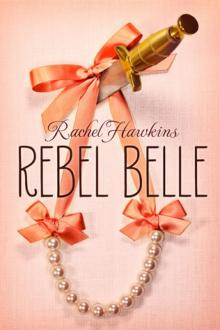 Rebel Belle
Rebel Belle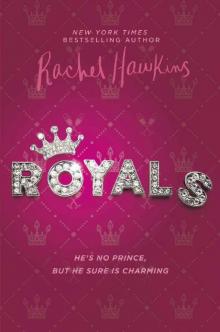 Royals
Royals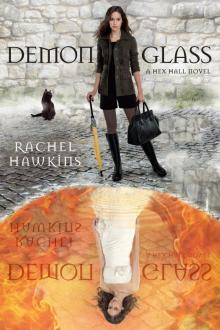 Demonglass
Demonglass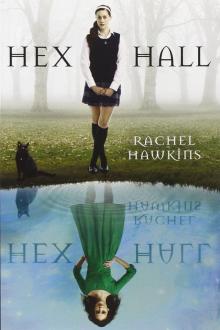 Hex Hall
Hex Hall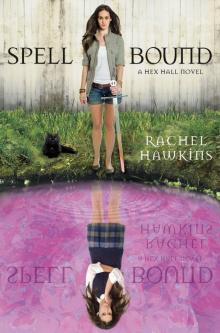 Spell Bound
Spell Bound Her Royal Highness
Her Royal Highness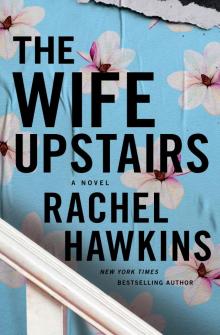 The Wife Upstairs
The Wife Upstairs Journey's End
Journey's End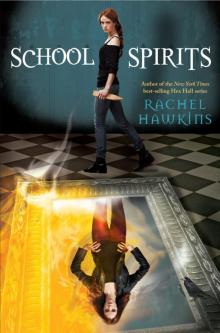 School Spirits
School Spirits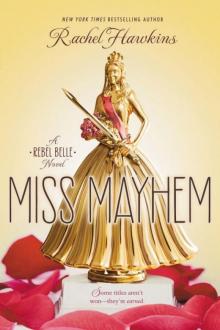 Miss Mayhem
Miss Mayhem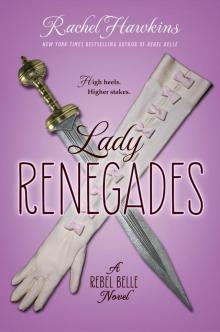 Lady Renegades
Lady Renegades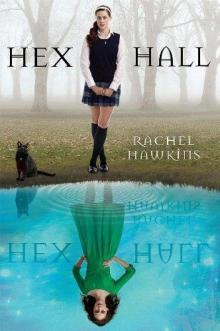 Hex Hall Book One
Hex Hall Book One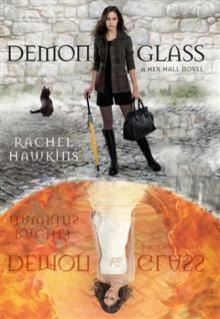 Demonglass hh-2
Demonglass hh-2